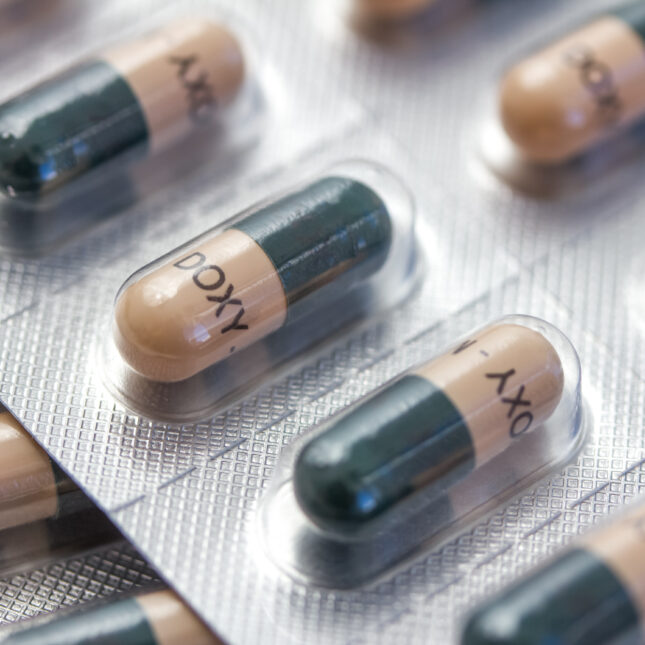
The Centers for Disease Control and Prevention finalized its guidelines for post-exposure prophylaxis against bacterial sexually transmitted infections on Tuesday. For groups at higher risk of contracting syphilis, chlamydia, and gonorrhea, the agency now recommends taking doxycycline, an antibiotic, within 72 hours of having sex.
Doxycycline has been used to prevent malaria infection both before and after exposure, but this is the first time the antibiotic has been used prophylactically against STIs. “Doxy PEP represents the first new STI prevention tool in decades, at a time when innovation in the nation’s fight against STIs is desperately needed,” the CDC wrote in the guideline announcement. The spread of syphilis in the United States in particular has been cause for concern in recent years, as cases reach levels unseen since the 1950s.
The policy, which was proposed in October 2023, is based on evidence from three large randomized trials showing that a 200 mg dose of doxycycline, taken after potential exposure to sexually transmitted bacteria, reduced chlamydia and syphilis infections by more than 70%, and cut gonorrhea infections in half.
While effects against gonorrhea may be limited, and further interventions such as vaccines may be indicated, the prophylaxis has a chance of controlling the spread of chlamydia and syphilis, said Connie Celum, a professor of global health, medicine, and epidemiology at the University of Washington. “I think the big question now is just who adopts that? Are we able to reach the people who are at highest risk? And how well do they use it?” she said. Watching consistency and uptake, particularly as more providers begin prescribing doxycycline, will be essential to understand whether the intervention can have an impact on population health.
Doxycycline post-exposure prophylaxis, or doxy PEP, is specifically being recommended for men who have sex with men and transgender women who have had at least one bacterial STI in the previous 12 months. The CDC said providers should prescribe the antibiotic for self administration after sex.
Though the official guidelines don’t specify that doxycycline should be taken after condomless sex, the studies that the recommendation is based on tested the antibiotic after unprotected sex. “The benefits are really for people who are, for whatever reasons, not using condoms and who are at an elevated risk of acquiring gonorrhea, chlamydia, and syphilis,” said Celum, who was the co-principal investigator of one of the trials, DoxyPEP.
The new guidelines largely implement last year’s proposal, with a few additions and clarifications, said a spokesperson for the CDC. The changes stress shared decision-making between patient and practitioner, noting that doctors should review a patient’s full list of medications, including over-the-counter drugs, to avoid interactions with doxycycline. The new guidelines also confirm a maximum daily dose of 200 mg, and recommend reassessing a patient’s need for prophylaxis every three to six months, including regular STI testing.
Based on current studies, potential harm from the prophylaxis appears limited. Doxy PEP may be useful for individuals outside the highest-risk groups, but research is limited; the CDC recommends doctors use their judgment to counsel patients. Commenting on the proposed guidelines, the American College of Obstetricians and Gynecologists urged the CDC to prioritize further research of doxy PEP, particularly for cisgender women of reproductive age who may experience long-term reproductive health effects following STIs.
The guidelines also highlight the importance of equitable distribution and access, which has limited the effectiveness of pre-exposure prophylaxis programs for HIV: According to the CDC, Black men and women account for approximately 40% of persons who qualify for PrEP, but only 13% of users are Black.
Ongoing studies will continue to evaluate the effects of doxy PEP, both in preventing infections and in its possible impact on the development of antimicrobial resistance. So far, said Celum, doxycycline has been used for the primary treatment of chlamydia and as an alternative to penicillin to treat syphilis, and has not caused resistance, though that doesn’t eliminate the need for ongoing surveillance.
To submit a correction request, please visit our Contact Us page.









